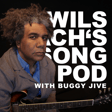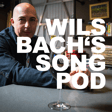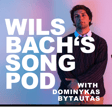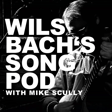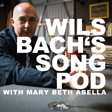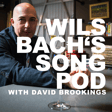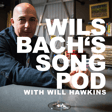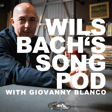Become a Creator today!Start creating today - Share your story with the world!
Start for free
00:00:00
00:00:01

Episode 3: Dylan Galvin
My guest today is a West Coast singer-songwriter an incredible guitar player and a graduate of Berklee College of Music. His recently released “How to Write a Pop Song” is a well crafted modern pop song that delivers some light-hearted, side-eyed shade about what hits with popular audiences these days. He followed that single up with a cover of a Beatles classic Norwegian Wood.
We go down a songwriterly rabbit hole about lyrical depth (or lack thereof) in modern pop music, the lyrics of John Mayer, Japanese Lo-Fi and Will Ferrell’s performance in Zoolander.
Join my Patreon: http://www.patreon.com/wilsbach
Recommended
Transcript
Introduction: Deep Dives into Music
00:00:01
Speaker
Welcome to Willsbach's SongPod, a show where we dig deep into the songs and artists that move us and how we're moved to craft the songs we write. I'm Tim Willsbach and I write, release and perform music as Willsbach and you can find me anywhere you stream music. Let's dig in.
Guest Introduction: Dylan Galvin
00:00:17
Speaker
My guest today is a West Coast singer-songwriter, originally from the East Coast, an incredible guitar player, a graduate of Berklee College of Music, and has toured nationally. He's been featured in Paste Magazine, Voyage LA, and has won several awards for his musicianship. He recently released How to Write a Pop Song. It's a well-crafted modern pop song that delivers some light-hearted, side-eyed shade about what hits with popular audiences these days.
00:00:41
Speaker
He followed that single up with the cover of a Beatles classic, the George Harrison penned, Norwegian Wood, which she added a guitar solo to.
New Music and Creative Process
00:00:49
Speaker
ah Welcome to Willsbach's song pod, Dylan Galvin. How are you today, buddy? I'm doing well. Doing well. Excellent. Excellent. Where does this podcast find you today? This finds me in sunny ye sunny Los Angeles, California, Woodland Hills. And on about hour 35 of no sleep, I had a ah not the greatest night of sleep last night. So I i didn't sleep. So I'm a little slow and loopy.
00:01:21
Speaker
but uh the good thing about that is that that can segue into uh i have a single coming out on may 29th called the human condition and that song was inspired by a series of events that started with a long bout of insomnia so um yeah it's kind of like i don't know so I guess it's subconscious marketing of the single. Yeah, there you go.
Promotional Strategies and Industry Critique
00:01:50
Speaker
Let's talk about that how to write a pop song single. So that's, like I said in the intro, that's a pretty pretty well crafted pop song. And it's you pretty accurate, I think, lyric wise on on how to ah how to write a pop song. Every time I release a song, I do the traditional
00:02:07
Speaker
release strategy like I have a social media content strategy. I submit to SubmitHub and Groover and Musosoup and I hit up radios and playlists. I send it out. Yeah, it's kind of funny. Some of the feedback I got from some of the pop playlisters, well, it seems they they weren't too appreciative of the lyrics. They felt it stung them a little bit too too close to home, I guess, because some people were like, you know you are mean you know, I actually submitted it to a songwriting competition and and some of the judges
00:02:42
Speaker
We're like, well, I don't know why you have to say, you know, negative things about pop music, because it's like, well, I mean, most of it, it sucks. and And the thing that I don't like is that it garners so much attention. And the value, the value in the artistry of the song is not proportional to the attention that it gets. Like, it's totally inverted. um And it's almost like It's almost like parallel with the food industry in that 100 years ago, everything was organic, right? There was no such thing as artificial sweeteners. It was just everything was organic. Everything everything was fine grown. And slowly, everything was corporatized and productized. and And everyone was like, how can I make a little money by taking these things and adding other things so I can make more money than if I didn't add the things because the goal is money.
00:03:33
Speaker
And you know after 50, 70 years of doing that, then what you're left with is things that are not really food. I mean, they're edible. They're not necessarily toxic, but it's not really food. It's food like product. And I think that's exactly what the music industry has done. They have slowly gone from something and they've tried to kind of capitalize on the mystique of an artist and actual artistry and manufacture that.
Views on AI and Music Commercialization
00:04:00
Speaker
um to an audience that is you know perpetually less discerning than the previous generation and now we have music like product and it's it's gone full full force because now we have a AI creating songs where there's nothing there's nothing real about it. It's just totally fake and we not have to compete with that but I think that one step down from that is kind of um
00:04:24
Speaker
um I'm just going to rag on him. There's a song called Unholy by Sam Smith. And Sam Smith is a very talented singer. He's he's one of the best singers. But something that is like really popular to do now is like the singer gets all the gets all the credit and they have like a team of 12 to 15 people writing a song. And it's like, when you have 15 people writing a song, nothing about that song is genuine. it's It's just totally sterilized. You have too many cooks in the kitchen, and you can't say anything real or authentic, because they're all just trying to create something for maximum maximum you know visibility and appeal to the lowest common denominator. Like, don't put any big words,
00:05:08
Speaker
don't put any complex chords you know don't put any chromatic notes keep it simple and smooth and vanilla and make it catchy and the theme simple and appeal to the basil instincts of people and i just wanted to like roll that all up all into a ball and just like like throw it into the ocean so that's basically and i I feel like I did it in kind of like a lighthearted way with how to write a pop song. There's more cynical versions like Bo Burnham did a song called repeat stuff, which is like super cynical. um And I was like, I was dabbling in that, but I wasn't going full on, full on cynic. I was just kind of like lightheartedly, cause it, cause it is a pop song and I do like pop. I still like pop and I like the
00:05:51
Speaker
you know, kind of some of the memories I have associated with pop and just the lightheartedness of it sometimes, but I think where where I as an artist get weary of it is where it's just so pervasive and it's so ubiquitous everywhere you look. It's just pop, pop, pop, pop. It's like, can we, what about jazz? Maybe we'd be nice to get some jazz or or maybe some fusion or some and anything other than, you know, the same, billboard songs every time you go anywhere. um And I think that's what so when people say that, oh, I hate pop. I don't think it's like
Reflecting on Music Complexity and Change
00:06:25
Speaker
they hate pop, but they get annoyed by they're not trying to seek it out and it pops up in front of them.
00:06:55
Speaker
I came across an article. i wish I wish I could find it again. I'm going to have to take a look for it. but it was and I'm probably going to bungle what it actually said, but my my memory of it is that basically in the last however long, 20, 15 years, whatever it is, um you used to be able to look at you know melodies of popular music and they kind of you know they kind of run run the gamut of yeah notes essentially throughout the scale. and as we've gotten closer to today, they've tightened and tightened and tightened. And it's almost like, and I think I remember them specifically, and you know what, it might've been an Andrew Huang video on YouTube. Anyway, but the point was he was saying basically they're they're very, it's almost like a straight line now. It's just you you hit the note, a lot of times it's the two and you just hang on that. And you may be very up or down a little bit, but you don't want to stray too far from it because audiences today, they kind of know what they know.
00:07:49
Speaker
and you know you you write on the the one four five six and then that's that's all there is to it and and there's no room for nuance cuz audiences are i disagree with this but the the the popular sentiment is you know audiences you can't they can't be trusted to you know to have any more nuanced taste than just those very basic building blocks and just keep repeating those
Melodic and Lyrical Evolution Studies
00:08:13
Speaker
things. it's like It's funny, I think I might have actually cited that study in my press release for the single. Oh, um no way. Yeah, because there was there is a study done that it was the reduction of melodic variation, harmonic variation, and lyrical content. like The same thing is happening with lyrics too, where
00:08:31
Speaker
we had all these words and pros and it just keeps reducing till like we're we're down to like, you know, fifth grade. And it's like, don't use a complex word. Because if you use a complex word, there's 10,000 people out there that don't know that word. And then the profit margin goes down a half a percent. And you don't want to alienate anyone. It's like, no, alienate them. Like write what is good and true. And if a person doesn't get it, then let them go. And I feel like, the the music industry has made listeners lazy listeners. They don't know how to listen anymore because something that was so good about music 40 years ago, you could open up a CD and look at the liner notes and the lyrics and you would have to sit and kind of look at it like a puzzle and you'd have to figure it out and you'd go over it over and over and you might listen to a song, you know, 50 times before you finally go,
00:09:23
Speaker
Oh, that's what that lyric means. Like, I totally get it now.
Balancing Reflective Lyrics with Production
00:09:27
Speaker
But it's only within the context of the rest of the song that I finally understand it. And the the artist was intentionally doing that. They were putting complexity and you know um euphemisms and in double entendres, not necessarily like sexual, but but they were being clever with the way they were writing and they were putting their intelligence into it. Now it's like, don't do anything. You don't want to lose them. So it's like you're basically open up your diary of a like, like you know, you as a 12 year old, and ah you made me so sad, you broke my heart and we're in a car and we go to the bar. And it's like, yeah, keep it super simple and appeal to emotion. And and I just I
00:10:04
Speaker
ah can't stand it. yeah no i'm working with ya i have I have a i have a ah ah deeper, ah my my taste runs a little more deep than yeah then that kind of stuff. That said, I don't want i don't want to, and um' ah you know you've said you like pop music too, but there's something to be said about that simple stuff, it's not it's not easy to write a song that connects with a large audience. and it's just it As an intelligent person that's done that's studied music and lyric and and the stuff that you appreciate and that I appreciate has a lot more depth to it, it's hard to understand how somebody can listen to you know
00:10:40
Speaker
And I was like, baby, baby, baby, no. I'm like, baby, baby, baby, no. And that's a song that people connect with. And you're like, what, what, what are you listening to? What are you grabbing onto? There's, there's nothing there. There's this, I don't know. You may have seen this. There's been a, there's a a meme going around a few years ago and it's got a picture of Frank Sinatra and then a picture of Justin Bieber. And I don't mean to pick on Justin Bieber because I think he was 13 at this time and yeah whatever. But like, It's got a lyric. And ah next to the picture of Frank, it says, with each word, your tenderness grows, tearing my fear apart. And that laugh that wrinkles your nose, it touches my foolish heart. And then butneath beneath that, there's a picture of Justin Bieber and it says, and I was like, baby, baby, baby, no, I'm like, baby, baby, baby, no, I'm like, baby, baby, baby, no. And like, again, it's, it's, it's, you know, poke and fun. And it's obviously reductive, but
00:11:29
Speaker
Still, it's it's to the point that you're making is is. Yeah, there is the tendency is that as you get older, you kind of think that your generation was the best and music was, you know, those are the good old days. But like, aside from all that, like, there is an objective decline, like a scientifically verifiable reduction. Sure. yeah yeah That's like totally independent of like the bias of you getting older. So yeah, I felt compelled as a songwriter. It's like, is it I feel like, ah you know, the movie Zoolander? Uh huh. but tiny field Will plays the crazy guy, Mugatu, and he's like, when he's like, he's like, Blue Steel, Latigra, like, it's all the same look. I feel like I'm taking crazy pills here. Like, that's what I feel like when I'm listening to these songs. I'm like,
00:12:13
Speaker
This song is just like this song is, which sounds like that song. It's like the same song again. And and people are like, oh, it's so great. Well, it's interesting too, because we're in this time where basically the history of recorded music is available to to us at the click of a button at home, in the car, on the bus, the beach, wherever you are. There's good music
Influences and Songwriting Advice
00:12:32
Speaker
being made. I don't know if you're, I'm a big fan of Dawes. Taylor Goldsmith is an incredible lyric writer. um So there' there's there's music to be found that kind of ah you know Scratches that itch but yeah it's it's a question of like why why does why does the popular culture not not dig into that anymore, especially when you know we have you you can good you don't have to listen to new music, you could can dial into whatever. buts you know i have ah I have a 14-year-old son.
00:13:00
Speaker
who, and and I love him so much, ah but I do not love his musical taste and you know hes stuff that he listens to is you know whatever. that's That's his thing. and Part of it is he's probably trying to listen to something different than his dad does, but he's got one of his buddies. He's like one of his buddies listens to classic rock all the time. I'm like, yes, great. go You know, I'm a fellow old guy here, but I'm like, yeah, that's the good stuff, man. Listen to that. And and that's great that he can do that. He's got, you know, he's he's not relying on tight playlists on a radio station anymore. He's digging into I don't know how he found it or how he got into it, but he's it's available to him. So it's just just an interesting observation. It's you know something to encourage you also. I think 70% or 80% of all the music that is consumed today is actually old music. Oh, interesting. People are gravitating towards the old stuff still, which is like, I'm like, OK, cool. OK, so that song, that's kind of that's almost like you're ah you know what what anti-inspires you right like ah who do you. Who are the songwriters that that do inspire you that are putting out things that that do kind of
00:14:03
Speaker
you know, fill you up a little. i am a big um'm I'm a really big fan of John Mayer because he's one of the few, I think, who has gotten totally in the mainstream, ah like been in the mainstream in the pop world. But he's been able to introduce a mainstream audience to sub genres that are not typically mainstream or are are no longer mainstream. Like a Americana and folk in blues and he's able to still stay a storyteller he's able to balance listenability with um You know still bringing his musicianship and and complexity into it. He's got a song called st. Patrick's Day I think there's like 40 or 50 chords in it. Oh, wow
00:14:44
Speaker
Which is really, really, really cool. I do i like John Mayer. i I listen to... Speaking of John Mayer, I'm with you on that. I like his... but Specifically, his Continuum record, I think, has some really amazing stuff on it. And specifically, belief the song, Believe, the lyric on that is incredible. That's one of the ones I was thinking of. Yeah, belief belief is a beautiful armor, but makes for the heaviest sword, like punching underwater, you never can hit who you're trying for. um I think that's a very, I like, I wish sometimes I'm like, John Mayer, pick a side, come on, let's hear what you really feel. Because he he always, he stands neutral and he observes society going after each other, but he never like,
00:15:25
Speaker
He never gets too far one way or or the other. I think that's a PR move. But um sometimes I want to hear him come out guns-a-blazing because some songwriters just do that. They're like, I don't care. I don't care if I offend half of the world. I'm going to say this. yeah I like when artists are willing to be brave like that. um
Writing Meaningful Songs and First Lines
00:15:44
Speaker
so There's also something to be said for for being a little general and letting letting whatever side you're on and you know finding finding that message yeah in the lyric. It's vague enough, but there's enough there that you can attach to. right like that's yeah yeah if you yeah yeah if you could pick like pick You pick your side, but your side isn't one of their sides. It's like you you you define where you stand, and then you observe the situation in a way where you declare without just kind of um
00:16:11
Speaker
kind of stonewalling half of all people, um yeah which I think is is good. I think a good songwriter can do that. um paul Paul Simon, James Taylor, great lyric writers. And then film film scores. I love film scores because they can't use lyrics to get um to get the emotion. They have to get the emotion with just the music. Yeah. ah So I love kind of taking little elements here and there of film scores I like and trying to integrate that into my my writing, sometimes more subtle, sometimes less. So let me ask you that, based on what you just said about film scores. So when you're starting sitting down to write a song, ah what comes first for you? is it Is it the music? Is it the lyric? is it you Maybe it's different every time? like How do you approach that?
00:16:57
Speaker
I prefer to have the lyrics first as a lyricist because I you know i got to meet Paul Simon when I was at Berkeley. And one of the things he said, it was like, if you have to choose between. making a melody that sounds pleasant and sacrificing what you wanna say, or saying what you wanna say and sacrificing the melody, always sacrifice the melody. The words are more important. that's what That was from from the work from the mouth of Paul Simon. And and i I totally believe that. And that is so counter to today where you know they say, oh just write a melody and see what words you feel like saying once you've written the melody. I'm like,
00:17:38
Speaker
That is, I don't i just yeah like that. It's backwards. It's yeah backwards. And you don't, I feel like the the main point of a song is to convey meaning. It's to, it's to tell a story. It's to share something to share something true. And if you do it backwards, it's almost like the way that people look at songs now is the way they kind of judge women. It's like, Well, what does she look like with makeup on, all done up, ready to go out? Well, that's how much she's worth. And and and nothing yeah nothing else. not not Not her character, not what she likes or dislikes. Just what does she look like up front, right there on the spot? That's exactly how people are listening. And I'm just, ah!
00:18:13
Speaker
um yeah Yeah, that was cool. it's easy It's easy to fall into that trap too. At least I know for me and part of that is where we're at now. you know I'm sitting in front of my computer here. I've got my MIDI controller over here and I can dial up Logic and I can dial up an amazing drum beat and I can have a pretty slick slickly produced song almost quicker than I can, not almost, like quicker than I can really write the lyric. And it's really easy to just let that, to run with that. Because that's that's kind of the easy and the fun part, right? And then I'll i'll deal with the lyric later and I'll keep what I'm trying to say. and the The songs that are the best for me are the ones that I start with on with a notebook and a pen and a paper sitting on my couch reflecting on something that's
00:19:01
Speaker
you know, bugging me or something that's inspired me or or whatever, whatever that impetus comes from, as long as when it starts with the lyric or the emotion, it's always better than the production. It's kind of what you're saying with, you know, you know ah judging a book by its cover kind of kind of thing. So that that's an interesting it's interesting take. I like that. A person that listens to a song and listens for the lyric, they will ultimately, in the long run, I think enjoy the song more than a person who just listen listens to melody or beat, because there's ah there's an instinctual, immediate gratification of listening to melody and beat. It's like flavor, right? Flavor's good, but nutrition keeps you alive.
00:19:41
Speaker
there's a you know it's like if you just go for flavor all day every day every time you eat something i just want flavor i just want flavor you'll just start to not feel good all the time because you're not getting anything good in your body and i i think there's a parallel to that with music if you're just going for what sounds good um you can enjoy that but it just doesn't have the same kind of depth that a really powerful lyric has, especially when you have to think about the lyric. And that's one thing where I always put i always butt heads against the cultural narrative about like, music should make you feel. Now, I'm not saying it shouldn't make you feel, it should, but music should also make you think. And no one ever says that. Literally, I never hear it in any interview or any podcast. They go, well, you know, I just i just listen to what makes me feel.
00:20:28
Speaker
you know And you want to make the audience feel like, what don think we need we really need people to think more today. like We totally need that. And that's something ah that made the folk songwriters like the rebels of the 60s, those rebel songwriters, in they call out the government. They call it injustice. they would They would sing about these things. They would challenge people to think them through using the gift of prose and lyricism and poetry. But now it's like, nah, just go with go with the wave. like Get as much attention as you can and make that dollar before they turn to something else. and Yeah, it's a it's a challenge. It's a challenge because for for what you said, the way that you create, like the lyric I think the lyric is usually the hardest part also. and um yeah I mean, you still have to find that emotion and and connect to that. Yeah, you want to. That's the trick.
00:21:16
Speaker
Yeah, make make it make a cerebral if if that's your if that's your thing. And, i you know, I think you and I are the same. And that's the kind of stuff that we that we grat gravitate to. But whether it's whether it's a deep amount of prose, or it's a very simple message, those can both be effective as long as they're communicating the message and they're and they're connecting to the audience in a certain way. But Totally. the best I think the best song is a song that makes you feel and makes you think. And they kind of work synergistically in the song. And then you can listen to it over and over again and rather just feel an emotion. You you kind of get reflective or it it just draws something out. And that's another thing that I think John Mayer is very good at. He's very good at making you
00:21:59
Speaker
just nailing you with it. There's just a lyric here, a lyric there and his songs that really get you. um Stop this train. I don't know if you've heard that one. Yeah, that's a good one too. Yeah, really good. It's like um age aging parents, right? Yeah. When I hear that, he's like, I don't know how else to say it. don't know' Don't want to see my parents go one generation one generation's length away from farting, laugh out on my own. when i I'm like driving to my car and I hear that. yeah Ultimately relatable. um right yeah Yeah, interesting. so yeah he's I'm also big on on first lines, like the intro to the song, kind of something that sets the scene. um i read I read something last week, at a ah ah friend posted, and it was Bono, for whatever reason, is writing letters to like kind of open letters to people. And this one he was writing to Prince, and this is after Prince has passed. But um part of the letter he says, you're a master of the establishing shot. Right. And then he he's is quotes, you know, dig if you will, this picture you and I engaged in a kiss. Right. Or I was working part time in the five and dime. My boss was Mr. McGee. Right. Yeah. You don't have to be beautiful to turn me on. John Mayer has a good one, too.
00:23:12
Speaker
Again, going back to belief, is there anyone who ever remembers changing their mind from the paint on a sign? like yeah Boom. like You know immediately. You might not know like fully what it's about, but like from that beginning, yeah you're you're in. so I guess my question to you then is, how much do you focus on that you know that scene set, that opening that
Concise Songwriting in Modern Culture
00:23:33
Speaker
opening line? Is that a thing for you or not so much? That has become increasingly important now. And that's one of those things where I think that the ah culture, the direction of the culture has actually been beneficial because you are forced to be able to immediately grab ah attention or else just people won't listen to anything unless it like immediately gets them. And I have a tendency to want to get to the good stuff like,
00:24:00
Speaker
like halfway down the song and I think that can be sometimes like artistic laziness and I'm kind of like well you know they let them listen to like three or four verses before it's like no it's good to be able to just like slam them in the face from the very first line and and you should treat every like every single line is important. It's kind of like Twitter, like Twitter is actually really good in that it forces you to very pithily say what you you you need. you You have to learn how to say something and like say it in the most efficient way possible. And our so our songwriting teacher, I think a couple of them at Berkeley made us do that. They're like, okay, say something and you have
00:24:40
Speaker
the whole line to say it. They're like, okay, say that same thing, but now you only have 10 words. Say the same thing and now you only have five words. Say the same thing, now you only have three. And you're like, hu how can I say the three words? yeah But it's like, you just never think about that. You're so used to kind of your own linguistic cadence and kind of like jogging with information at your own pace it forces you to stop and like really okay the next step you take it has to be a very important step so don't say a word that you don't need and when you do that you go back through your song you're like oh i i totally reiterated myself twice in that in verse two i said the same thing two different ways so i can ah eliminate line two and say something else there or rearrange it and um i i think that's a good thing i think that's a really good thing
00:25:26
Speaker
Even just going back and doing rewrites and just looking for those spots where you're redundant or you're not saying the thing that you want to say. so you You mentioned you you studied at Berkeley. Did you ever study under a guy named Pat Pattison? Do you know that do you know that name? Hold on one second. Yeah, you've got the book, Writing Better Lyrics. Let's see if I have oh where is it. Where is it? up Almost got it. da Oh, you know what? Okay. Anyways, I didn't, I have it somewhere. Oh, is this it? Is this it? Oh, yes. All kinds of, I have his writing better lyrics book and I have this one and this is like Olympic metaphor creation. Like
Writing Techniques and Avoiding Cliches
00:26:18
Speaker
this will flatten, you get this book immediately. It's called Songwriting Without Boundaries.
00:26:24
Speaker
Okay, excellent so excellent. This is the most labor intensive lyric writing book I have ever come across. um they teach He teaches you how to write in the key of moon. oh right You're like, what does that even mean? And then you start thinking of words that are in the key of moon. like astronaut mysterious far away remote glowing controlling tides waxing waning eclipse so it's like something you can use in your song so like when you're telling your song you lyrically stay in the same key so the whole thing matches thematically rather than like okay this first i'm going to do a metaphor about this and now i'm going to put a simile here and then i'm going to start talking about like world war two over here and get it's it keeps it like you know
00:27:09
Speaker
Format, but this it it gets so crazy the exercises are just like but yes he He was one of my teachers and he is like a mad scientist. He was if I remember correctly i He's the one that introduced me to object writing. Is that that's that's him, right? Yeah. Yes. Yep And for anybody listening that doesn't know what object writing is It's basically you kind of reflect back on a time or a place And it's a specific thing in that place. Like I remember the first time um that I that I did it. um My dad and my mom used to have this. It looked like a treasure chest wooden and it had like these, um you know, metal like hasps on it and like, yeah, kind of looked like a treasure chest, but it was I think it was a jewelry box.
00:27:56
Speaker
It ended up just being a place where they kept stuff in their room. right so and It was always fascinating to me as a little kid and I've always had this picture of this thing in my my you know my memory. and so yeah so like The idea would be just put pen to paper for however 20 minutes or whatever and just talk about, just describe that item, where it is, how it exists, how you reacted to it, just kind of explore that whole thing. And it's just it's just ah it's a really good exercise about how to paint a picture of of a time or a place or a thing. Am I mean like getting that right? It's been a while since I've read about it.
00:28:37
Speaker
That's pretty much it. i mean you take You basically take your five senses, ah you know touch, smell, taste, sound, sight, and you write you pick like pick an object from your childhood. It could be bowling ball, it could be grass, it could be jewelry box, or treasure chest, or bed, and you go back to that memory. You go back to the memory, you picture it in your head and you start writing. What did the jewelry box smell like? what did it what What did it taste like? And maybe you wouldn't taste a jewelry box, but what were you were you chewing on a Tootsie Roll while you were in that memory? And so you want to take the listener through the medium of only text and transport them as accurately as possible into what you have envisioned in your mind.
00:29:19
Speaker
And it is like, it's such a good exercise. I mean, you don't, it's it's very gratifying to when you do it day after day and you start, it's almost like ah an exercise in nostalgia because you get to go through like actual childhood experiences and re-remember them. I love that. I love that. I love that. Yeah. That in itself too is also maybe a little excavation too. Maybe as you're digging around in that memory about this benign thing, it might trigger some other memory in you that
00:29:51
Speaker
brings up an emotion that you want to explore that you can, as you know as as being the craftsman as a songwriter, you can then you know build up and turn into an emotional song that resonates and connects with the people that you're singing to. so And I also, for whatever reason, I remember putting puppies to sleep. Yes. Sleeping puppies. There was something about metaphors, having boring metaphors, like cliche metaphors, like ah we're going through the storm together. it's like because you know it's it's It's not a bad idea, but it's like so many people have done the idea that it loses. The more people do the same thing, it's it's almost like there's a collective draining of the energy of that idea until they forget about it. It has to recharge over
00:30:33
Speaker
40 years and then people go, oh yeah, that's a great idea. Let's do that again. I i remember hearing a lyric one time, some local artists, who I don't exactly remember, but one of her lyrics was, the snow falls down like rain. i'm like Come on. yeah it' like You got it also you gotta keep works you gotta to keep that one. you can't just I mean, I get it. like Get it on the page. But that's that's one to rewrite for sure. um Here's a question. i So I have a list of questions. I probably should have sent you sent you these beforehand so you could have prepared a little bit. But maybe this is a little little more fun to just be spur in here in your sleep-deprived state. just Yeah. We got baby paraphernalia all over the room.
00:31:15
Speaker
that little smooshmallow or whatever it is. yeah Is there a song in the popular, well I might have an idea since you just released a cover. Maybe this is it, maybe it isn't. Is there a song that you wish you'd written? A famous song that that people know that you wish you'd, or maybe not not famous, but is there a song that you wish you'd written? A song that I wish I wrote. That is a very good question that I have not thought about. Yeah. um ah What spoke to you about Norwegian Wood to to the point that you wanted to cover that? My dad bought me Rubber Soul for like my 12th birthday as a CD. It was like one of the first CDs I ever had. And this is like, you know, late 90s, I think. So I had a boombox. I put it in my boombox. I would just listen to it over and over and over.
00:32:04
Speaker
And that was one of the songs that I liked because it was so different than the rest of Rubber Soul. um Rubber Soul had a lot of ah kind of like pop rock, alt rock, and I guess Michelle was also kind of like an acoustic ballad, but it was just this weird, jolly,
Musical Nostalgia and Current Listening
00:32:19
Speaker
it was almost whimsical, i like little gnomes frolicing in the woods. It just had this very whimsical vibe to it. and the lyrics were mysterious and i never really knew what it was about and and it's ironic because i'm totally about knowing what the lyrics are about that was one of those songs where it's kind of about the nostalgia of it and that it was like a half my happy place song
00:33:12
Speaker
So what's on repeat right now for you? Last night, I listened to a lot of Japanese lo-fi. Oh. I don't even know what that would mean. I don't have no idea what that would sound like. So lo-fi is kind of like this. If you're listening to instrumental hip hop with no lyrics okay and you and you're underwater and you're about to and you're about to fall asleep, you're just in this kind of cozy space and there's like a cat in the window cell and ah and a TV playing static and like a candle flickering and you're and you you can see out the window all the cars going by.
00:33:51
Speaker
and you but you And you kind of feel like you're underwater. That's like the vibe of lo-fi. It's kind of like this winding down kind of going into like peace mode before you sleep. But it's like base it's rooted in hip hop. But it's like hip hop with very old old school kind of sounds like crackly record player, old keys, almost like ragtime sounding or jazz sounding. on And it's just so different than a lot of other music. It's a very specific genre. I love listening to that. I've been listening to a lot of that. It's almost like a palate cleanser for what you're trying to listen to. It's kind of like sniffing the coffee beans between different wine plates or whatever.
00:34:40
Speaker
it's Yeah, it's like taking a bite of ginger when you're having sushi. there you go Yeah, and Japanese lo-fi in particular because it had they they incorporate like traditional Japanese instruments into it. But lo-fi in general is a cool genre. um I listen to a lot of ambient stuff just because when you're doing music so much, you kind of want to listen to music that doesn't feel like it's work. yeah You know what I mean? Because your work mode brain, you go, oh like oh, I could take that production idea, or that's a cool piano chord. maybe i could It's like, no, I need music that's so different than what I do that I just listen to it, and I don't analyze it. Yeah, I listen to a lot of bebop, like bebop jazz.
00:35:21
Speaker
Awesome. Same kind of thing. Yeah. It's not something that I'm going to, that I'm writing. I'm not yeah issue by any stretch. I'm a, you know, cowboy cord kind of, kind of writer. Um, yeah, I dig it. There's a certain vibe about it. Just puts, takes me back to, listen't it culture I love Coltrane. Yeah. So much. Um, Naima. Yeah, definitely. Giant Steps is a big one too. Yeah, yeah I love Coltrane. I got introduced to that kind of stuff. So there were two reasons. So I went to Indiana University, and i i I'm a television editor. That's what I do for a living, or what it's what I used to do for a living. One of the reasons I'm doing this podcast now is because Hollywood is not doing much of anything these days, and I've got all kinds of time. So this is a way to film.
00:36:04
Speaker
Awesome. But anyway, while I was in college, I worked at the TV station there. It's kind of like a work-study situation um and just like kind of in the shop. And the guy that would run the shop, you know, fixing lights or painting sets or I don't even remember what we all did setting stuff up. But he had a you little transistor radio and and he would always put on this jazz station and it played that kind of stuff. And then at the same time, I was also a theater major. um And I was in a play, and the soundtrack that they put together between scenes had a lot of John Coltrane in it. um So that's how I was introduced to him. And it just the combination of those two things, like, man, I really dig this music. so Yeah, it's cool. There's something so sweet about listening to something on an AM radio. There's this instant good vibe. I feel like Lo-Fi kind of has that vibe too, although it's not as nearly as virtuoso. It's called it's kind of like take a snippet of Coltrane.
00:37:02
Speaker
I like just a little snippet and like make that the basis of the whole song and then just like slow and groovy like wave. But yeah, I think you'd like. Yeah, I love that. I love that. ah So you've got ah another single coming up. um I don't remember the name of it, but you you mentioned it at the at the top. So let's talk about that a little bit.
Song Inspirations and Life Reflections
00:37:21
Speaker
This song is called The Human Condition. And part of it is inspired by um Michael Jackson wrote a song called Human Nature. And I cover that song. I love that song. I think it's a great song. it's It's beautiful. I wanted to take that idea and kind of translate it in a theological framework, like looking at it from the perspective of God and the human condition. The song is about, you know, I was going through ah probably about two years of really intense insomnia. Like I was not i wasn't getting really any sleep at all.
00:37:59
Speaker
I yeah couldn't sleep and this song was about someone who's going through and incredible suffering and they're looking for truth and they don't want to admit to themselves what it is. They they want to look everywhere else um and the tendency for people I think there's a tendency and you can just see online. Everyone says that the problems that we have in our society or the problem with this or the problem with that is those people over there.
00:38:32
Speaker
It's always them. It's never me. um and Everyone wants to always externalize it, but part part of it is like being willing to admit your own sin. like I'm a sinner. I'm not i'm not a perfect person. i'm not I don't always do what's right. And I can't sit there and point out the problems of every person in the world and and exempt myself morally and say, well, I'm a good person. I don't do anything wrong. But I think that's what our tendency is. and I had to kind of face that, ah the experience of going through the insomnia and I started, ah my grandparents got me this little Bible.
00:39:10
Speaker
They went to Israel. They went to Jerusalem a a while ago and they got me this tiny little Bible. It was a King James Bible. So I don't know if you ever read a King James Bible. but It's kind of hard to understand. It's like, you know, thou hast verily spake. yeah it's it's just It's old English. So it was challenging to read, but um I started reading it and I could understand enough of it just to start kind of getting the framework of what would later be my faith. And the human condition is about that search, kind of about that examination.
00:40:08
Speaker
And yeah, it's made it kind of cinematic and ethereal. All right, nice. So that one that one's in the can and that's coming up next. What's the follow up? What's next for Dylan? The next song that I have in the in the books is a song called My Favorite To-Do List. I had a friend, I would say, pay me $10 and I'll write a custom song for you. it It was actually from that, and I had a friend named Brielle, and she was like, write a song about how I'm going back to college. And so I wrote a song called My Favorite To-Do List, and it was about just being thankful during a season of life, like little things, you know, cup of coffee, you know, your little dog in the background, just like little things like that. And um that's, that's, it's like kind of like an Americana folk song with a pedal steel in it. And that's, that's the next one. And I'm excited. It's kind of like a fall song, but, you know,
00:40:58
Speaker
Whatever. I'm going to release it in the summer and break the rules. Yeah, why not? Break the rules. I like it. Exactly. Excellent. Well, this has been a fun conversation. Thank you so much for joining me. I think, yeah, we have a lot in common about how we approach songwriting. And yeah, this has been great. Thank you so much for spending some time with me. Sweet. Thanks for listening to Wilsbox Songpod. You've made it this far. Please rate, review, like, love, add, subscribe, do all the things on whatever app it is that you're hearing my voice. That lets the almighty algorithm know that interesting people like you like this show and will serve it up to other cool and interesting people. Wilsbox Songpod is produced by Wilsbox Entertainment LLC. Mixed, mastered, and edited by me, Tim Wilsbox. See you next time.
